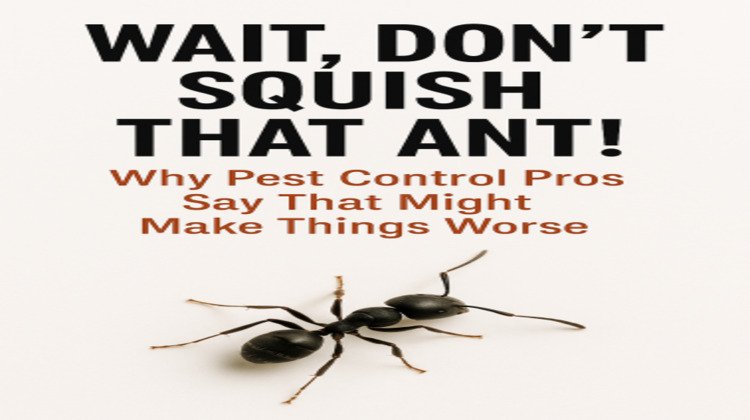We learn from PestControlGlobal.com how frustrating it is to capture a line of ants marching across your kitchen. The natural tendency for most is to grab a tissue and squish the little trespassers one by one. While that is bound to deliver some short-term satisfaction, pest control experts recommend that it may be the last thing you can do. Squishing ants may release a domino effect, resulting in much greater ant infestations.
In this comprehensive guide, we’ll explain why killing ants on sight can backfire, what’s really happening beneath the surface of your infestation, and what professionals recommend instead.
Why Squishing Ants Can Make Things Worse
1. Pheromone Trails: An Ant’s SOS
If you squish an ant, the rest of the colony is not in the dark. Ants communicate mainly in terms of chemicals called pheromones. One type of pheromone, the alarm pheromone, is released when an ant is threatened or stepped on. This chemical signals other ants to the danger. Ironically enough, this warning can draw ants to the site in an effort to defend the colony or evaluate the threat.
2. Colony Budding: How Infestations Spread
Specific species of ants—Argentine ants and pharaoh ants, say—are particularly troublesome because of a process known as "budding." When threatened by chemical sprays or by being killed, some of the foraging ants, these colonies may fragment into multiple satellite colonies to preserve their viability. Instead of having an individual ant problem, you then have many. Budding makes it harder to eliminate infestations and more immune to standard DIY methods.
3. You're Only Treating the Symptom, Not the Cause
A point well taken here: the ants you see are merely the tip of the iceberg. The vast majority of the ants in a colony are out of sight, hidden underground or behind walls, including the queen, the true power source of the infestation. Killing visible ants does nothing to target the colony itself. That's why squishing is so ineffective and counterproductive.
What You Should Do Instead: Expert-Approved Ant Control Tips
If you’re serious about getting rid of ants, you’ll need to change your approach. Here are science-backed strategies recommended by pest control professionals:
1. Use Slow-Acting Bait Products
Ant baits are among the most effective for long-term control. These are often sweet food or protein food laced with a slow-acting insecticide. Foraging ants take the bait back to the colony and share it with the queen and rest of the colony. Slowly but surely, the colony is wiped out from the inside.
Tips for successful baiting:
- Do not eliminate foraging ants when there is bait around. You need them to take it home.
- Bait along ant trails but out of the way of children and animals.
- Be a little patient. In a few days, the result will be evident, but the payoff is much better than from spraying.
2. Keep Your Home Clean
Ants are always on the lookout for food and water. To discourage your home:
- Daily wipe down countertops with crumbs and residue wiped off.
- Keep food in sealed containers.
- Empty trash daily.
- Fix leaky faucets and pipes to eliminate sources of moisture.
- Cleanliness will not kill a colony, but it will remove what's inviting them in.
3. Seal Entry Points
Keeping ants out of your house is the other important piece of the puzzle.
- Seal cracks in doors, windows, and foundations with caulk.
- Repair damaged window screens and weather stripping.
- Install door sweeps to seal the space under exterior doors.
- Taking these actions can greatly reduce the ants that find their way into your home.
4. Natural Repellents as an Add-on
If you prefer green solutions or want to add to professional-strength offerings:
- Diatomaceous Earth: This powder dries out and kills ants by breaking down their exoskeletons.
- Vinegar and Water: A 50/50 mixture can disrupt scent trails but does not destroy the colony.
- Essential Oils: Peppermint and tea tree oils are natural repellents. Mix with water and spray entry points.
Natural methods can help with control, but they usually don’t eliminate colonies.
When to Call a Professional Pest Control Service
If you’ve tried all the above and ants keep coming back, it’s time to bring in the pros. A licensed pest control technician can:
- Identify the species of ant (important for selecting the right treatment).
- Discover hidden colonies and nests.
- Utilize industrial-strength baits and treatments unavailable in neighborhood stores.
- Give you year-round home ant prevention strategies to keep your home ant-free.
At PestControlGlobal.com, we provide specific pest control services for homes and businesses. Our professionals are trained to handle everything from minor pests to major infestations using safe and science-based methods.
Final Thoughts: Think Twice Before You Squish
Even if it seems like a great idea at the moment, stomping on ants will probably make things worse. Alarm pheromones will bring more ants to the scene, and messing with a colony might cause it to split and spread out. Effective ant control starts with understanding how ants work and using techniques that strike at the colony itself, rather than the symptoms.














